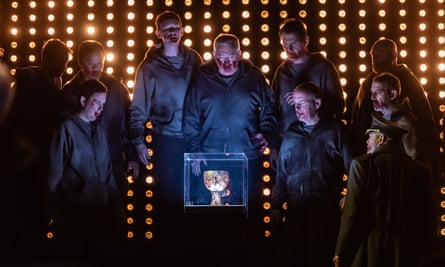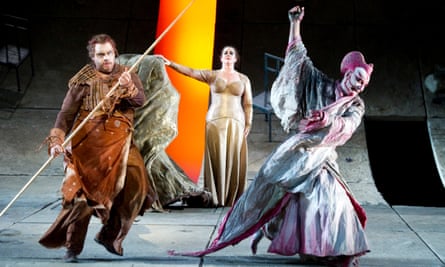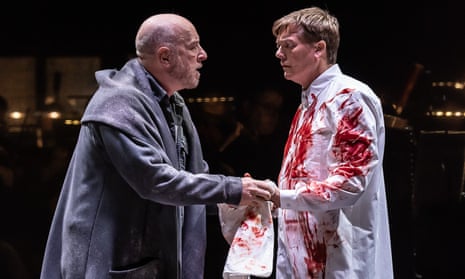I’m singing in a Wagner opera and I’m having a ball. Once I never thought I’d say that – I was always a little intimidated by his operas and also by those who sing them. Even though I’ve now sung in quite a few of these epics, I still feel I’m walking on hallowed ground. Much of this is, of course, nonsense. Wagner’s operas may require something different to Mozart’s operas from both the singer and the listener but it doesn’t mean that they are “better” or indeed more “special” than the rest – in fact I’m far from alone in thinking that Mozart’s The Marriage of Figaro is perhaps the most perfect opera ever written.
But for many others, Parsifal would give it a run for its money, and it is this, Wagner’s last great work, that I am part of now.
He took his time composing this one – 25 years to be exact – but he was also otherwise engaged writing several of his lengthiest operas during that time. We say “opera” but Wagner described Parsifal as a “consecration of the stage” and it’s easy to see why it became a tradition at his Bayreuth festival to not applaud at the end of Act One. The music is astonishing in its scale and beauty and leaves audiences reeling even by the end of that first act. One of my colleagues suggested that if Wagner were around today he would probably be our most famous celebrity film-score composer, and you can hear so much of his influence in the great MGM and Cecile B DeMille movies of the past, all the way through to Star Wars, Lord of the Rings and many of today’s blockbusters.
The plot is based on the tale of the knight Parsifal and his quest for the holy grail, but to put it as simply as that is to do a disservice to the composer, the piece and its devotees. For the sake of space, please permit me to suggest you look online to explore further some of the many great minds who have pondered its wider and deeper meanings.

The role I’m singing is the old knight Gurnemanz. Bizarrely, despite being the longest role of the opera by a clear hour, in terms of notes sung, he is not one of the main characters of the story. He is, in effect, the narrator, but one who is actively involved in the events and carries all in his head and heart. It’s a bucket list role for an operatic bass and I’ve wanted to sing it ever since I first heard it performed at the Royal Opera House several years ago.
What is so great about it then? It is so multifaceted and gives the singer lots of opportunities to show what he can do, and you need all the tools in the box to do it. There’s slow sustained singing (like press-ups, always harder than the quick stuff) loud and dramatic, soft and tender; there’s anger, sadness and ecstasy to portray, and it requires a large vocal and dynamic range.
The opposite of a “park and bark” role, this is one that requires vivid storytelling. Diction needs to be front of the mouth stuff, and perhaps most importantly, you need heaps of stamina. If you were to set your stopwatch and sing the role from beginning to end non-stop it would take about 95 minutes, and that doesn’t include time standing on stage while someone else is singing at you. By comparison the role of Parsifal is approximately 25 minutes of actual singing – and he still gets the best dressing room!
I’m fairly sure I could not have sung this fella even 10 years ago, I just didn’t have the vocal stamina or power. It’s important to tackle this repertoire only when you have got a few miles on the clock and know better what you’re doing vocally. I remember as a keen and cocky 24-year-old bringing some Wagner along to a singing lesson and my brutally honest teacher asked in her heavy Scottish accent “what the …. do you think you’re gonna do wi this?” Brilliant.
Gurnemanz is so skilfully written that it rarely “hurts” but I do have to talk myself through some of the last, long and high phrases: “Come on Brin, come on, steady, relax, breathe, here we go and … woah not too bad, nearly there, one last top note and … (just) made it.”
Because it’s my first shot at this role it’s taken well over a year to learn the reams of German text and I’ve had many a disturbed evening going through the part, grinding to a halt and having to get up and find my music score to see what that bloody line was. I still need to spend a good half hour going through each act with the score before each performance as I can be very easily distracted during the performance by either the attire of two chaps in the front row or a rather lovely oboe solo and miss the start of my line.
Some of our performances will be in a concert format in concert halls. Unlike in Leeds’ Grand theatre where our first four performances were, we will be largely static and without costumes, set or lighting but I doubt this will dampen the impact of this piece. My experience of opera as a semi-staged concert has always been just as impactful as a fully staged version. For a start, you get to actually see the orchestra. Watching dozens of bows sweeping and flailing, two harps, rows of gleaming brass and two timpanists hitting the heck out of the drums is a wonderful spectacle and you will be genuinely surprised by how many musicians are involved. Then without distractions such as, say, a strange set or costume design or a terrible wig, the evening becomes more about the music and the text, and the onus is on the singer to bring it all to life.

I dare say that there will be many Wagner lovers – or Wagnerati as I like to call them – at these performances and they really are extraordinary people. They are able to discuss at length the differences between the two Knappertsbusch recordings of 1951 and 1964 and Wagner’s interest in Kabbalah and gematria and they also know my role far better than I shall ever do. I’ve met quite a few at Wagner Circle events and I resort to nodding politely while pulling out the “I just sing them” card.
However, please don’t worry if you’re not as keen, knowledgable or as passionate, this music and this story of suffering and redemption will still blow your socks off and change you. Some years back I was involved in a production where things were not all hunky dory in the rehearsal studio (a clash of egos) and my solace from all the silliness was to dash over to English National Opera where Nikolaus Lehnhoff’s staging of Parsifal was playing, to catch the prelude and let it calm me down. By the end of Act One I loved everybody.
Gurnemanz spends much of his time lamenting how bad things have become and desperately waiting, in hope for things to get better. Can we possibly relate to that in any way?
